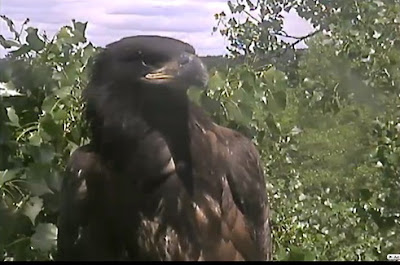
Saturday, June 18, 2011 8:25am PDT
A momentous week for the world's most popular bald eagles, and for hundreds of thousands of people who have gotten to know the raptors intimately during the past 10 weeks, was capped Saturday when one of three eagle chicks embarked on its maiden flight.
All three eaglets, made famous thanks to a web-cam that spies on their nest in Decorah, Iowa, on Thursday and Friday had flapped to and from a nearby branch. "Branching" typically precedes maiden flights, and early Saturday one of the young raptors flew a considerable distance from the nest tree, and back again.
Bob Anderson, director of the Raptor Resource Project, said he arrived at the nest tree at dawn local time and could locate only two eaglets. A bit later he witnessed the missing eaglet flying about 200 feet toward the nest tree. It perched on a branch above the 80-foot-high nest, beyond range of the web-cam. It remains unclear how far the eaglet flew but Anderson said it "looked as though it had been flying all of its life."
Ordinarily, this would not be a big deal. Bald eagle chicks are hatched each spring throughout their range and ultimately fly off to live on their own terms. But this is no ordinary situation. Web-cam viewership for the Decorah Eagles has surpassed 153 million. Since the eggs hatched in early April, typical daytime viewership, at a given moment, is between 20,000-30,000. (See the live feed below; it does not show the eaglet's maiden flight.)
Many are repeat visitors, or "Eagleholics." They watch from home, work, and even during late-night hours, thanks to infrared lighting. The more passionate among these admirers have, in essence, adopted the eagle family, and now must say their goodbyes the feathered youngsters, who have grown so remarkably fast.
One Eagleholic, on a Facebook page devoted to the raptors, claimed to already be experiencing "empty-nest syndrome." Another on Saturday posted, "They are almost moving too fast for me."
Said Anderson, whose research group maintains the web-cam: "It has turned into what is probably the world's most logged-on wildlife education tool on earth. Hundreds of thousands of people have been able to see the wonder of nature, the cruelty of nature and the awe of nature. It has been an incredibly popular wildlife education tool. I think it's unparalleled."
Reasons for the immense popularity of this particular raptor web-cam, when so many others exist, stems perhaps from its high quality, the use of non-intrusive night lighting, sound, and a camera that can be panned from a remote location.
The parents, which in recent years have successfully reared other offspring from the same nest, have done an amazing job with this trio. The family has endured snow storms, ferocious winds and sibling squabbles.
While it's time to fledge, however, it does not mean an end to this story. The eagle chicks, while they may or may not return to the nest after maiden flights, will remain in the vicinity for at least six weeks, crying for handouts from their regal, white-crowned parents. Unless they do return to the nest or nearby branches, however, they will not be visible on the web-cam.
For research purposes, Anderson's team will capture one of the eaglets post-fledge eaglets and attach a solar-powered transmitter in an attempt to learn where it will spend the early part of its life.
"Every day we'll be able to tell the world that this bird is in Missouri, Mississippi or Des Moines," Anderson said. "We will have a website that will follow this bird for years to come. The most common question I get is, 'What happens to the babies,' so we're going to try to answer that question."
As for the parents, they'll stay put. In late October, barring incident, they'll begin to rebuild their nest. In December they'll be in full courtship and in February more eggs will be laid.
Will the world be able to keep tabs on the growth of that eagle family, too? Anderson, though he and his team have been besieged by emails and phone inquiries every day for the past 10 weeks, paused before giving an answer.
"I guess we have no choice," he said. "I don't think the world would accept us for not doing this again next year."



No comments:
Post a Comment